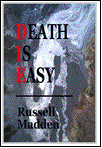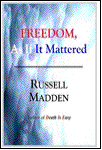 |
 |
|
|
 |
 |
|
|
While the gears of Hollywood grind glacially (and hopefully inevitably) towards the production of a Repairman Jack movie, F. Paul Wilson is not resting on his laurels. In addition to writing new and revising old RJ novels that fill in the gaps leading towards Jack's last adventure -- Nightworld (when Jack saves the universe) -- Wilson is keeping his speculative and storytelling skills sharp in other fictional worlds.
His "New Age" thriller, The Fifth Harmonic (in which a doctor with throat cancer must choose between disfiguring surgery and reliance on a woman named Maya) will be published in November. Midnight Mass, due next March, seeks to revive the traditionally nasty vampires of old as the undead seek to conquer the world.
Wilson's most recent novel, Sims, however, peeks just around tomorrow's corner to ponder a question we or our kids may well have to answer one day soon: what does it mean to be human?
Answers to that query enjoy a long tradition in science fiction literature. Mary Shelley conceived Frankenstein in 1816 as a means of exploring the theme. Writer Harold Bloom contends that "...the monster is more human than his creator" ("Afterword," Frankenstein, Signet, p. 216, emphasis in original). This answer, however, begs the question of what the defining characteristics of "human" are that distinguish us from the "nonhuman." Moreover, Victor Frankenstein's monster has the advantage, if you will, of being constructed from human parts. He is not formed from the basic stuff of life but rather from its ultimate, i.e., human form.
Robert Heinlein tackled this contentious issue in his too-infrequently reprinted 1947 short story, "Jerry Was a Man" (collected in Assignment in Eternity). Written in the wake of Hiroshima and Nagasaki, this tale reveals the fate of "Workers," genetically modified talking anthropoids "developed from true apes" (p. 176). Assigned to menial or heavy labor tasks, these leased "neo-chimpanzee," gorilla, and other ape-derived Workers literally become dog food when no longer able to perform their tasks. The controversy regarding their humanity is settled and the killings stopped when the Worker, Jerry, has his day in court. Seeking equal legal status with the Martians already acknowledged as "men," Jerry cinches the deal when he sings "Old Folks at Home" ("Way Down Upon the Suwannee River") with its echoes of past slavery.
Unfortunately, Heinlein also sidesteps the core problem. While he acknowledges the role of intelligence in determining one's humanity, he says that "'manhood'...cannot be defined," only "experienced" (p. 192).
Still, the issue of who shall count as a person reverberates through hundreds of science fiction stories, whether the creature under scrutiny is a space alien or the handiwork of people here on terra firma. As scientists and engineers grow more sophisticated in their techniques, we may someday face a society such as suggested in David Brin's recent Kiln People with its "clay" people acting as surrogates for "real" humans or the potentially closer culture Wilson gives us in Sims.
Sims exhibits a few broad similarities to "When Jerry Was a Man." (Wilson says he never read Heinlein's story; the logic of this kind of situation, though, is likely to lead to some similar plot points.) The Sims of the title are genetically-modified chimps able to talk in pidgin English who are leased as workers to the public by the politically powerful SimGen corporation. The founders of this organization are the brilliant brothers, Mercer and Ellis Sinclair. Since SimGen has a patent on the sim genome, it alone is able to profit from the labors of these newly minted creatures. Unlike the workers in Heinlein's story, however, Sims are retired at the end of their careers rather than minced into pet food...a much wiser PR move.
Nevertheless, opposition exists to those who treat Sims as "a product, a commodity -- property..." (p. 25). Labor attorney Patrick Sullivan inadvertently becomes involved in challenging this designation when Tome -- a Sim who can read -- recruits the ambitious and opportunistic lawyer to help establish a Sim union so aging Sims are not separated from their "family." Since these workers are "classified...as neither humans nor animals; since they did not occur naturally..." (p. 25), they cannot legally be recognized as eligible for such a human organization as a labor union.
Sullivan's unlikely ally in this David vs Goliath combat is Romy Cadman, a woman fiercely determined to alter the Sims' status quo. In her position with the "Office for the Protection of Research Risks," Romy seeks to ferret out and end abuses against Sims committed by less scrupulous members of society. She is deeply offended by the very notion of "...a recombinant species of primates created to be slaves" (p. 30) and ultimately hopes to end the practice that has brought SimGen immeasurable wealth.
She is aided in her seemingly quixotic quest by the mysterious "Zero," a literally shadowy figure who refuses to reveal his identity to his recruit. Zero has resources of both money and information that suggest he is connected to a much larger, subversive and covert group struggling to topple the behemoth that is SimGen. Even more dedicated than Romy is, Zero keeps his sole focus on the apparently futile cause of freeing Sims from their constricted and constrained lives. With corresponding dreams for a better world, he and Romy grow closer; he, drawn to Romy's commitment to principle; she, to Zero's basic decency and humanity.
Their task is herculean. SimGen is not about to go quietly into the night of corporate liquidation. While Ellis Sinclair lingers in the background with emotional problems, his brother, fifty-two-year-old Mercer, forges ahead to squash Patrick Sullivan's annoying legal maneuvering and to counteract the criticism of such religious fanatics as the TV-savvy "Bible thumper," Reverend Eckert. This evangelist refers to the purveyors of ape workers as "SinGen," assuring his listeners that these servants of Satan will ultimately answer to the Creator "on the day of Final Judgment!" (p. 36).
Courtroom battles, though, are not SimGen's only means of defeating those who dare challenge the legitimacy of the goose laying those golden eggs. The company's chief of security, former solider Luca Portero, does not flinch from more direct solutions to those threatening SimGen's existence...and his own livelihood. Both Sullivan and Cadman must face the inimitable Mr. Portero as they progress in their struggle to establish a new social dynamic for the Sims. Before this undeclared war ends, the mettle of all involved will be tested beyond anything they might have imagined. As in any such significant cultural upheaval, some will suffer, some will die, and some will triumph...though which denouement will qualify as which is not always crystal clear.
As with many Wilson titles, "Sims" operates on two levels. The word can refer either to the simian nature of these products of genetic engineering or to the deeper concern of how to treat those considered to be nothing more than simulated humans. Given that Sims can talk and read; that they sport tattooed bar codes reminiscent of Jews under the Nazis; and that they bear an obvious similarity to intellectually retarded human beings, the sympathies of the reader are stacked in their favor. Only to a politician or an unscrupulous corporation would the correspondence to an untenable slavery appear questionable.
Like many other writers who have delved into these sometimes murky waters, Wilson also does not dwell upon the finer philosophical issues involved in establishing which beings are or are not deserving of the rights due human beings. Indeed, given the requirements of his story, the debate is ultimately deflected from any direct consideration of the principles necessary for unraveling what will one day be an immediate argument we must resolve.
(For example, as "animal rights" activists such as PETA [People for the Ethical Treatment of Animals] and ALF [Animal Liberation Front] grow more extreme and violent in their fight to win legal recognition for nonhuman animals, we will have to face the consequences of past concessions to their demands and widespread evasions about the true nature of rights.)
Sims offers the reader an opportunity to ponder issues of self-identity and betrayal; to recognize the importance of ethics and goals in making life worth the living; to realize that any new technological advance is a double-edged sword; to understand that honor and integrity and dignity can come packaged in a variety of external packages.
Sim does what good a narrative should do: it provides an interesting and suspenseful story involving characters deserving of the spotlight shone upon them. And for this reviewer, at least, the novel does something equally important: it encourages the reader to think.
And that is something we surely need more of today...before the world of Sims is transformed from an engaging story into a grim reality.